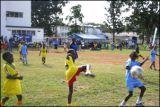Protecting and Promoting Health
Over the years, WHO has supported government strengthen maternal and child health services through a number of activities like immunization, Safe Motherhood, and implementation of the Integrated Management of Childhood Illnesses (IMCI).
Immunization programmes, started in 1983. At that time, measles was the leading cause of death among children. By 1987, after countrywide immunization against all childhood immunizable diseases, measles ceased to be an important cause of mortality in children and likewise the other diseases were reduced significantly.
Presently, WHO, together with other partners notably UNICEF and Rotary International is assisting the government to eradicate polio. National Immunization Days (NIDs) for polio-eradication have been implemented and will be carried out over the coming 4 years until polio is eradicated from Uganda.
Other diseases being targeted for eradication are tetanus of the newborn, guinea worm and leprosy.
WHO is supporting government to expand the “Making Pregnancy Safer” initiative that was succeffuly piloted in Soroti district. It brings together the core cluster of interventions to which all women are entitled i.e. family planning, quality ante-natal care, clean and safe delivery and access to essential obstetric care for high risk pregnancies and complications.
WHO has assisted government to develop and implement an integrated approach to management of childhood illnesses. The programme is designed to address major diseases of the sick child as opposed to programmes which address single diseases. It gives attention to prevention and treatment of the commonest childhood diseases, which include diarrhoea, pneumonia, malaria/fever, malnutrition and measles. It also emphasizes the importance of immunization, vitamin A supplementation if necessary and improved infant feeding including exclusive breast-feeding and advice to mothers.



